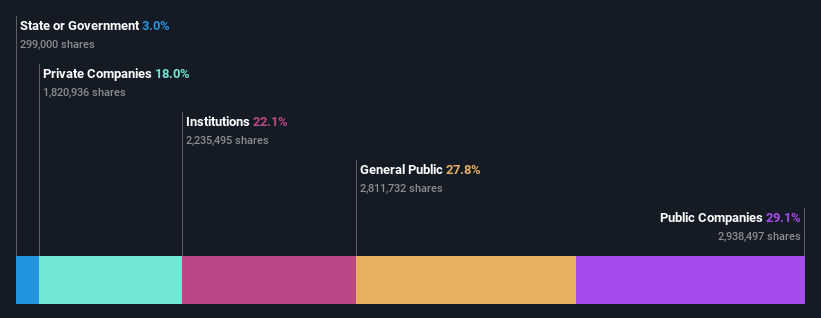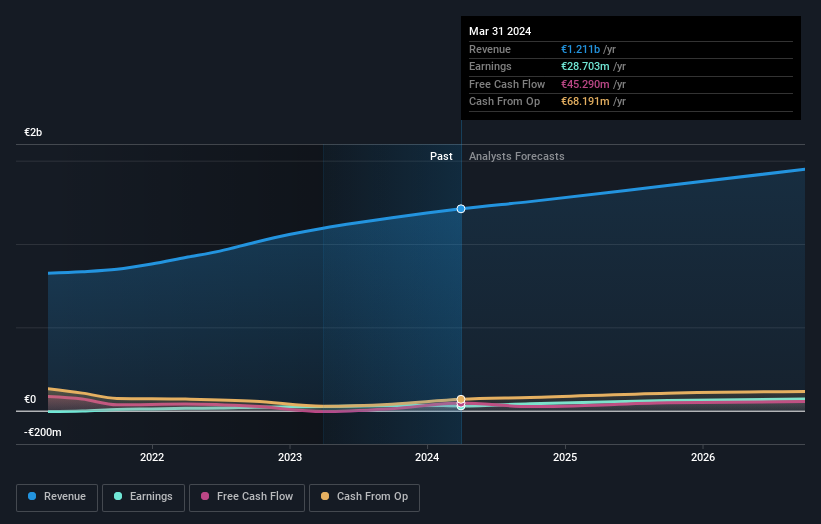- Germany
- /
- Professional Services
- /
- XTRA:BDT
Public companies among Bertrandt Aktiengesellschaft's (ETR:BDT) largest stockholders and were hit after last week's 10.0% price drop

Key Insights
- The considerable ownership by public companies in Bertrandt indicates that they collectively have a greater say in management and business strategy
- The top 4 shareholders own 52% of the company
- Institutional ownership in Bertrandt is 22%
If you want to know who really controls Bertrandt Aktiengesellschaft (ETR:BDT), then you'll have to look at the makeup of its share registry. The group holding the most number of shares in the company, around 29% to be precise, is public companies. That is, the group stands to benefit the most if the stock rises (or lose the most if there is a downturn).
As market cap fell to €337m last week, public companies would have faced the highest losses than any other shareholder groups of the company.
Let's delve deeper into each type of owner of Bertrandt, beginning with the chart below.
View our latest analysis for Bertrandt

What Does The Institutional Ownership Tell Us About Bertrandt?
Institutions typically measure themselves against a benchmark when reporting to their own investors, so they often become more enthusiastic about a stock once it's included in a major index. We would expect most companies to have some institutions on the register, especially if they are growing.
Bertrandt already has institutions on the share registry. Indeed, they own a respectable stake in the company. This implies the analysts working for those institutions have looked at the stock and they like it. But just like anyone else, they could be wrong. When multiple institutions own a stock, there's always a risk that they are in a 'crowded trade'. When such a trade goes wrong, multiple parties may compete to sell stock fast. This risk is higher in a company without a history of growth. You can see Bertrandt's historic earnings and revenue below, but keep in mind there's always more to the story.

Bertrandt is not owned by hedge funds. Our data shows that Porsche Automobil Holding SE is the largest shareholder with 29% of shares outstanding. With 15% and 5.1% of the shares outstanding respectively, Friedrich Boysen Holding GmbH and Union Asset Management Holding AG are the second and third largest shareholders.
Our research also brought to light the fact that roughly 52% of the company is controlled by the top 4 shareholders suggesting that these owners wield significant influence on the business.
While it makes sense to study institutional ownership data for a company, it also makes sense to study analyst sentiments to know which way the wind is blowing. There are plenty of analysts covering the stock, so it might be worth seeing what they are forecasting, too.
Insider Ownership Of Bertrandt
The definition of an insider can differ slightly between different countries, but members of the board of directors always count. Company management run the business, but the CEO will answer to the board, even if he or she is a member of it.
Most consider insider ownership a positive because it can indicate the board is well aligned with other shareholders. However, on some occasions too much power is concentrated within this group.
Our data cannot confirm that board members are holding shares personally. It is unusual not to have at least some personal holdings by board members, so our data might be flawed. A good next step would be to check how much the CEO is paid.
General Public Ownership
With a 28% ownership, the general public, mostly comprising of individual investors, have some degree of sway over Bertrandt. This size of ownership, while considerable, may not be enough to change company policy if the decision is not in sync with other large shareholders.
Private Company Ownership
It seems that Private Companies own 18%, of the Bertrandt stock. It's hard to draw any conclusions from this fact alone, so its worth looking into who owns those private companies. Sometimes insiders or other related parties have an interest in shares in a public company through a separate private company.
Public Company Ownership
We can see that public companies hold 29% of the Bertrandt shares on issue. It's hard to say for sure but this suggests they have entwined business interests. This might be a strategic stake, so it's worth watching this space for changes in ownership.
Next Steps:
I find it very interesting to look at who exactly owns a company. But to truly gain insight, we need to consider other information, too. Take risks for example - Bertrandt has 1 warning sign we think you should be aware of.
But ultimately it is the future, not the past, that will determine how well the owners of this business will do. Therefore we think it advisable to take a look at this free report showing whether analysts are predicting a brighter future.
NB: Figures in this article are calculated using data from the last twelve months, which refer to the 12-month period ending on the last date of the month the financial statement is dated. This may not be consistent with full year annual report figures.
Valuation is complex, but we're here to simplify it.
Discover if Bertrandt might be undervalued or overvalued with our detailed analysis, featuring fair value estimates, potential risks, dividends, insider trades, and its financial condition.
Access Free AnalysisHave feedback on this article? Concerned about the content? Get in touch with us directly. Alternatively, email editorial-team (at) simplywallst.com.
This article by Simply Wall St is general in nature. We provide commentary based on historical data and analyst forecasts only using an unbiased methodology and our articles are not intended to be financial advice. It does not constitute a recommendation to buy or sell any stock, and does not take account of your objectives, or your financial situation. We aim to bring you long-term focused analysis driven by fundamental data. Note that our analysis may not factor in the latest price-sensitive company announcements or qualitative material. Simply Wall St has no position in any stocks mentioned.
Have feedback on this article? Concerned about the content? Get in touch with us directly. Alternatively, email editorial-team@simplywallst.com
About XTRA:BDT
Undervalued with adequate balance sheet.
Similar Companies
Market Insights
Community Narratives




